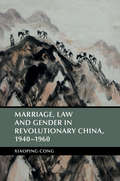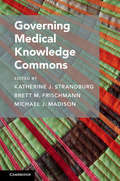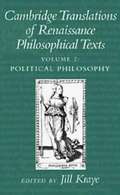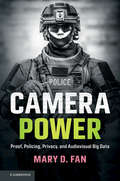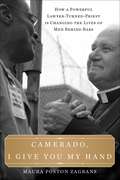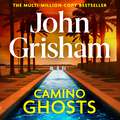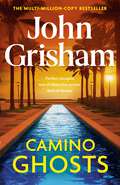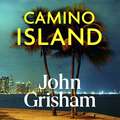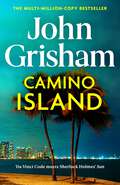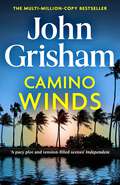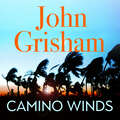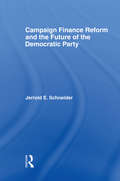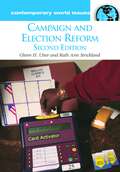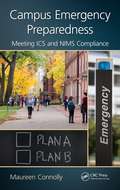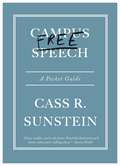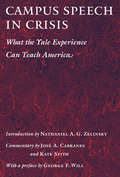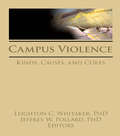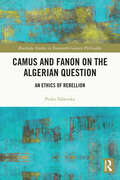- Table View
- List View
Cambridge Studies in the History of the People’s Republic of China: Marriage, Law, and Gender in Revolutionary China, 1940–1960
by Xiaoping CongXiaoping Cong examines the social and cultural significance of Chinese revolutionary legal practice in the construction of marriage and gender relations. Her book is an empirically rich investigation of the ways in which a 1943 legal dispute over an arranged marriage in a Chinese village became a legal, political and cultural exemplar on the national stage. This conceptually groundbreaking study revisits the Chinese Revolution and its impact on women and society by presenting a Chinese experience that cannot and should not be theorized in the framework of Western discourse. Taking a cultural historical perspective, Cong shows how the Chinese Revolution and its legal practices produced new discourses, neologisms and cultural symbols that contained China's experience in twentieth-century social movements, and how revolutionary practice was sublimated into the concept of 'self-determination', an idea that bridged local experiences with the tendency of the twentieth-century world, and that is a revolutionary legacy for China today.
Cambridge Studies on Governing Knowledge Commons: Governing Medical Knowledge Commons (Cambridge Studies on Governing Knowledge Commons)
by Michael J. Strandburg Katherine J. Frischmann Brett M. MadisonGoverning Medical Knowledge Commons makes three claims: first, evidence matters to innovation policymaking; second,evidence shows that self-governing knowledge commons support effective innovation without prioritizing traditional intellectual property rights; and third, knowledge commons can succeed in the critical fields of medicine and health. The editors' knowledge commons framework adapts Elinor Ostrom's groundbreaking research on natural resource commons to the distinctive attributes of knowledge and information, providing a systematic means for accumulating evidence about how knowledge commons succeed. The editors' previous volume, Governing Knowledge Commons, demonstrated the framework's power through case studies in a diverse range of areas. Governing Medical Knowledge Commons provides fifteen new case studies of knowledge commons in which researchers, medical professionals, and patients generate, improve, and share innovations, offering readers a practical introduction to the knowledge commons framework and a synthesis of conclusions and lessons. The book is also available as Open Access.
Cambridge Texts in the History of Political Thought: Plato
by Tom Griffith Malcolm SchofieldPresented in the popular Cambridge Texts format are three early Platonic dialogues in a new English translation by Tom Griffith that combines elegance, accuracy, freshness and fluency. Together they offer strikingly varied examples of Plato's critical encounter with the culture and politics of fifth and fourth century Athens. Nowhere does he engage more sharply and vigorously with the presuppositions of democracy. The Gorgias is a long and impassioned confrontation between Socrates and a succession of increasingly heated interlocutors about political rhetoric as an instrument of political power. The short Menexenus contains a pastiche of celebratory public oratory, illustrating its self-delusions. In the Protagoras, another important contribution to moral and political philosophy in its own right, Socrates takes on leading intellectuals (the 'sophists') of the later fifth century BC and their pretensions to knowledge. The dialogues are introduced and annotated by Malcolm Schofield, a leading authority on ancient Greek political philosophy.
Cambridge Translations of Renaissance Philosophical Texts: Volume I Moral Philosophy
by Jill KrayeThe Renaissance, known primarily for the art and literature that it produced, was also a period in which philosophical thought flourished. This two-volume anthology contains 40 new translations of important works on moral and political philosophy written during the Renaissance and hitherto unavailable in English. The anthology is designed to be used in conjunction with The Cambridge History of Renaissance Philosophy, in which all of these texts are discussed. The works, originally written in Latin, Italian, French, Spanish, and Greek, cover such topics as: concepts of man, Aristotelian, Platonic, Stoic, and Epicurean ethics, scholastic political philosophy, theories of princely and republican government in Italy and northern European political thought. Each text is supplied with an introduction and a guide to further reading.
Cambridge Translations of Renaissance Philosophical Texts: Volume II Political Philosophy
by Jill KrayeThe anthology is designed to be used in conjunction with The Cambridge History of Renaissance Philosophy, in which all of these texts are discussed. The works, originally written in Latin, Italian, French, Spanish and Greek, cover such topics as: scholastic political philosophy; theories of princely and republican government in Italy; and northern European political thought. Each text is supplied with an introduction and a guide to further reading.
Cambridge and the World Intellectual Property Organization: The Informal Economy in Developing Nations
by Erika Kraemer-Mbula Sacha Wunsch-VincentThe informal economy represents a significant share of output and employment in many developing countries. Yet little is known about this hidden engine of innovation. This pioneering study addresses some crucial questions, including: what is the role of the informal sector in economic development? How does innovation occur in the informal economy? How does it spread, who are the key actors and what impacts does it have? How do inventors and entrepreneurs in the informal economy reap benefits from their innovations? What stops informal sector innovation from scaling up? How can informal sector innovation in developing countries be measured? And what policies might support informal sector innovation and improve its impacts? This book will stimulate further work on this crucial but under-researched subject. As well as rich empirical evidence from several groundbreaking studies, it includes conceptual and methodological tools and policy recommendations to help researchers and policy-makers understand innovation in the informal economy. Opens a window to an important facet of innovation which has not been explored before Innovation within the informal sector is examined both conceptually and through several empirical studies Lays important groundwork for future empirical work, and for the development of appropriate metrics
Cambridge studies in international and comparative law: Civil Liability in Europe for Terrorism-Related Risk
by Niels Philipsen Bergkamp, Lucas and Faure, Michael and Hinteregger, Monika and Philipsen, Niels Lucas Bergkamp Michael Faure Monika HintereggerToday terrorism has become a world-wide phenomenon which does not stop at the European borders. Following the 9/11 attacks on the World Trade Centre and terrorist attacks in Paris, Madrid and London, concerns have arisen in Europe about potential liability exposure for terrorism-related damage. This book tackles the problem of civil liability for damage caused by terrorist acts from several angles. The authors expertly deliver a comprehensive analysis of terrorism-related risk under international and EU law and the national tort law systems of seven representative EU Member States. They also provide a comparison of the situation in Europe to the liability environment in the US. Risk mitigation strategies are considered and critically assessed, as are alternative systems for redressing terrorism-related risks. The book concludes with a reflection on the analysis and presents possible strategies for future regulation by the European lawmakers.
Cambridge studies in international and comparative law: Proportionality and Deference in Investor-State Arbitration
by Caroline HenckelsIn this study, Caroline Henckels examines how investment tribunals have balanced the competing interests of host states and foreign investors in determining state liability in disputes concerning the exercise of public power. Analyzing the concepts of proportionality and deference in investment tribunals' decision-making in comparative perspective, the book proposes a new methodology for investment tribunals to adopt in regulatory disputes, which combines proportionality analysis with an institutionally sensitive approach to the standard of review. Henckels argues that adopting a modified form of proportionality analysis would provide a means for tribunals to decide cases in a more consistent and coherent manner leading to greater certainty for both states and investors, and that affording due deference to host states in the determination of liability would address the concern that the decisions of investment tribunals unjustifiably impact on the regulatory autonomy of states.
Cambridge studies in law and society: Lost in China?
by Jones, Carol A. G.Rule of law is a core Hong Kong value, providing a defensive wall around the territory and protecting its way of life against 'mainlandisation'. Before the 1997 retrocession to China, fears were widespread that the rights and freedoms enjoyed under colonial rule would be eroded, that the rule of law would be weakened and that corruption would increase. Soon, the first blows were struck against the rule of law via an NPCSC ruling which overturned the judgment of the Court of Final Appeal. Successive interventions by Beijing in Hong Kong's legal and political affairs have given rise to fears about the loss of the rule of law and loss of identity. These fears have subsequently provoked mass street demonstrations, including the 'Umbrella Revolution' of 2014. But, as this book shows, Hong Kongers also use less explicit arts of resistance to maintain their identity.
Camera Power: Proof, Policing, Privacy, and Audiovisual Big Data
by Mary D. FanCamera Power is the first book to tackle the policy questions raised by two ongoing revolutions in recording the police: copwatching and police-worn body cameras. Drawing on original research from over 200 jurisdictions and more than 100 interviews - with police leaders and officers, copwatchers, community members, civil rights and civil liberties experts, industry leaders, and technologists - Mary D. Fan offers a vision of the great potential and perils of the growing deluge of audiovisual big data. In contrast to the customary portrayal of big data mining as a threat to civil liberties, Camera Power describes how audiovisual big data analytics can better protect civil rights and liberties and prevent violence in police encounters. With compelling stories and coverage of the most important debates over privacy, public disclosure, proof, and police regulation, this book should be read by anyone interested in how technology is reshaping the relationship with our police.
Camerado, I Give You My Hand: How a Powerful Lawyer-Turned-Priest Is Changing the Lives of Men Behind Bars
by Maura Poston Zagrans David T. LinkFor many years Dr. David T. Link helped young men and women prepare to become lawyers. After his wife died, and at a time in his life when most people retire, Dr. Link felt called to serve the Church and to aid the men that his profession normally put behind bars, ministering healing and forgiveness to murderers, thieves, and what many would call the least of society. This is a book about the value of human life, and about the transformative power of friendship and compassion. Meeting Father Dave gives us hope that one person can make a difference and, through successive reinterpretations of his own life's purpose, he makes the case for adding our own unique gifts to help the least of these, our brothers and sisters from all walks of life."Song of the Open Road" by Walt WhitmanCamerado, I give you my hand! I give you my love more precious than money, I give you myself before preaching or law; Will you give me yourself? will you come travel with me? Shall we stick by each other as long as we live?
Camino Ghosts: The new thrilling novel from Sunday Times bestseller John Grisham
by John GrishamFollowing John Grisham's international bestsellers, Camino Island and Camino Winds, Camino Ghosts is the story of an island off the Florida coast with a haunted, violent history and an uncertain future.Dark Isle off the Florida coast is said to be cursed: drownings, disappearances and hauntings have been the fate of intruders. The people who lived there were once enslaved. Now abandoned, it is the target of greedy developers. Lovely Jackson is the last survivor and claims to be its legal owner. But there is not a shred of evidence to prove that is true. It's unlikely that the developers will be deterred by the claims of one old woman. They have millions; Lovely only has Steve Mahon, a pro bono environmental lawyer, and Mercer Mann, a floundering novelist, to fight in her corner. With the court case looming and the bulldozers waiting to roll in, Steve and Mercer are in a race against time to unearth the truth behind Lovely's story and save the legacy of the island.Praise for Camino Winds:'In American icon John Grisham's new novel, Camino Winds, an odd assortment of mystery and crime authors, some of them felons themselves, discover one of their colleagues has been murdered during the fury of a massive hurricane-the perfect crime scene' Delia Owens, author of Where the Crawdads Sing'The Camino Island series, featuring trouble-prone bookseller Bruce Cable, is a perfect escapist mix of detective action, insider riffs on the literary world - and even a little romance' Mail on Sunday'Camino Winds has all the usual Grisham hallmarks - a pacy plot and tension-filled scenes' Independent'Another compelling read from Grisham, and will satisfy old fans and please new readers alike' Press Association
Camino Ghosts: The thrilling Sunday Times bestseller (June 2024) from John Grisham
by John GrishamFollowing John Grisham's international bestsellers, Camino Island and Camino Winds, Camino Ghosts is the story of an island off the Florida coast with a haunted, violent history and an uncertain future.Dark Isle off the Florida coast is said to be cursed: drownings, disappearances and hauntings have been the fate of intruders. The people who lived there were once enslaved. Now abandoned, it is the target of greedy developers. Lovely Jackson is the last survivor and claims to be its legal owner. But there is not a shred of evidence to prove that is true. It's unlikely that the developers will be deterred by the claims of one old woman. They have millions; Lovely only has Steve Mahon, a pro bono environmental lawyer, and Mercer Mann, a floundering novelist, to fight in her corner. With the court case looming and the bulldozers waiting to roll in, Steve and Mercer are in a race against time to unearth the truth behind Lovely's story and save the legacy of the island.Praise for Camino Winds:'In American icon John Grisham's new novel, Camino Winds, an odd assortment of mystery and crime authors, some of them felons themselves, discover one of their colleagues has been murdered during the fury of a massive hurricane-the perfect crime scene' Delia Owens, author of Where the Crawdads Sing'The Camino Island series, featuring trouble-prone bookseller Bruce Cable, is a perfect escapist mix of detective action, insider riffs on the literary world - and even a little romance' Mail on Sunday'Camino Winds has all the usual Grisham hallmarks - a pacy plot and tension-filled scenes' Independent'Another compelling read from Grisham, and will satisfy old fans and please new readers alike' Press AssociationCamino Ghosts was a Sunday Times top five bestseller in the first week of June 2024.
Camino Island: Sunday Times bestseller
by John GrishamAll trails became dead-ends. Tips that had at first seemed urgent now faded away. The waiting game began. Whoever had the manuscripts would want money, and a lot of it. They would surface eventually, but where and when, and how much would they want?The most daring and devastating heist in literary history targets a high security vault located deep beneath Princeton University.Valued at $25 million (though some would say priceless) the five manuscripts of F Scott Fitzgerald's only novels are amongst the most valuable in the world. After an initial flurry of arrests, both they and the ruthless gang of thieves who took them have vanished without trace.Dealing in stolen books is a dark business, and few are initiated to its arts - which puts Bruce Kable right on the FBI's Rare Asset Recovery Unit's watch list.A struggling writer burdened by debts, Mercer Mann spent summers on Florida's idyllic Camino Island as a kid, in her grandmother's beach cottage. Now she is being made an offer she can't refuse: to return to the peace of the island, to write her novel - and get close to a certain infamous bookseller, and his interesting collection of manuscripts . . .(P)2017 Random House Audio
Camino Island: Sunday Times bestseller (Camino Ser. #1)
by John GrishamA brilliant new series from the number one global thriller writer, John Grisham.SOMEONE IS ABOUT TO MAKE A KILLING ...The most daring and devastating heist in literary history targets a high security vault located deep beneath Princeton University.Valued at $25 million (though some would say priceless) the five manuscripts of F Scott Fitzgerald's only novels are amongst the most valuable in the world. After an initial flurry of arrests, both they and the ruthless gang of thieves who took them have vanished without trace.Now it falls to struggling writer Mercer Mann to crack a case that has thwarted the FBI's finest minds.***COMING SOON - CAMINO GHOSTS: PRE-ORDER NOW! *** Praise for Camino Island'A bewitching blend of high-stakes spying mission and summer romance, with a fascinatingly ambiguous central character' - The Sunday Times'The gripping plot will have you devouring the chapters in such a frantic fashion you'll begin to wonder if you are somehow complicit in this perfect crime' - Heat'Grisham shows charm, wit and a light touch' - The Times
Camino Winds: The Ultimate Summer Murder Mystery from the Greatest Thriller Writer Alive
by John GrishamThe Sunday Times bestseller from international bestseller John Grisham. Is a Perfect Storm the Perfect Time for a Murder? 'Another gem from John Grisham' Observer When Hurricane Leo threatens Florida's Camino Island, the Governor is quick to issue an evacuation order. Most residents flee but a small group of diehards decide to ride it out. Amongst them is Bruce Cable, proprietor of Bay Books in downtown Santa Rosa.The hurricane is devastating: homes and condos are levelled, hotels and storefronts ruined, streets flooded, and a dozen people are killed. One of the victims is Nelson Kerr, a friend of Bruce's who wrote timely political thrillers. But evidence suggests that the storm wasn't the cause of Nelson's death - he had received several mysterious blows to the head.Who would want Nelson dead? The local police are overwhelmed with the aftermath of the storm and in no condition to handle the case. Bruce begins to wonder if the shady characters in Nelson's novels were more fact than fiction. And somewhere on Nelson's computer is the manuscript of his new novel - could the key to the case be right there, in black and white? Bruce starts to look into it and what he finds between the lines is more shocking than any of Nelson's plot twists - and far more dangerous.Gripping, compelling and pacy, this exceptional thriller from international bestseller John Grisham is the perfect escapist read this summer.Praise for Camino Winds:'In American icon John Grisham's new novel, Camino Winds, an odd assortment of mystery and crime authors, some of them felons themselves, discover one of their colleagues has been murdered during the fury of a massive hurricane-the perfect crime scene' Delia Owens, author of Where the Crawdads Sing'The Camino Island series, featuring trouble-prone bookseller Bruce Cable, is a perfect escapist mix of detective action, insider riffs on the literary world - and even a little romance' Mail on Sunday'Camino Winds has all the usual Grisham hallmarks - a pacy plot and tension-filled scenes' Independent'Another compelling read from Grisham, and will satisfy old fans and please new readers alike' Press Association'The novel has enough plot twists to keep you engaged' The Herald 350+ million copies, 45 languages, 9 blockbuster films:NO ONE WRITES DRAMA LIKE JOHN GRISHAM
Camino Winds: The Ultimate Summer Murder Mystery from the Greatest Thriller Writer Alive
by John GrishamWhen Hurricane Leo threatens Florida's Camino Island, the Governor is quick to issue an evacuation order. Most residents flee but a small group of diehards decide to ride it out. Amongst them is Bruce Cable, proprietor of Bay Books in downtown Santa Rosa.The hurricane is devastating: homes and condos are levelled, hotels and storefronts ruined, streets flooded, and a dozen people are killed. One of the victims is Nelson Kerr, a friend of Bruce's who wrote timely political thrillers. But evidence suggests that the storm wasn't the cause of Nelson's death - he had received several mysterious blows to the head.Who would want Nelson dead? The local police are overwhelmed with the aftermath of the storm and in no condition to handle the case. Bruce begins to wonder if the shady characters in Nelson's novels were more fact than fiction. And somewhere on Nelson's computer is the manuscript of his new novel - could the key to the case be right there, in black and white? Bruce starts to look into it and what he finds between the lines is more shocking than any of Nelson's plot twists - and far more dangerous. (P)2020 Penguin Random House LLC
Camino Winds: The Ultimate Summer Murder Mystery from the Greatest Thriller Writer Alive (Camino Ser. #2)
by John GrishamThe Sunday Times bestseller from international bestseller John Grisham. Is a Perfect Storm the Perfect Time for a Murder? 'Another gem from John Grisham' Observer When Hurricane Leo threatens Florida's Camino Island, the Governor is quick to issue an evacuation order. Most residents flee but a small group of diehards decide to ride it out. Amongst them is Bruce Cable, proprietor of Bay Books in downtown Santa Rosa. The hurricane is devastating: homes and condos are levelled, hotels and storefronts ruined, streets flooded, and a dozen people are killed. One of the victims is Nelson Kerr, a friend of Bruce's who wrote timely political thrillers. But evidence suggests that the storm wasn't the cause of Nelson's death - he had received several mysterious blows to the head. Who would want Nelson dead? The local police are overwhelmed with the aftermath of the storm and in no condition to handle the case. Bruce begins to wonder if the shady characters in Nelson's novels were more fact than fiction. And somewhere on Nelson's computer is the manuscript of his new novel - could the key to the case be right there, in black and white? Bruce starts to look into it and what he finds between the lines is more shocking than any of Nelson's plot twists - and far more dangerous.Gripping, compelling and pacy, this exceptional thriller from international bestseller John Grisham is the perfect escapist read this summer.Praise for Camino Winds:'In American icon John Grisham's new novel, Camino Winds, an odd assortment of mystery and crime authors, some of them felons themselves, discover one of their colleagues has been murdered during the fury of a massive hurricane-the perfect crime scene' Delia Owens, author of Where the Crawdads Sing 'The Camino Island series, featuring trouble-prone bookseller Bruce Cable, is a perfect escapist mix of detective action, insider riffs on the literary world - and even a little romance' Mail on Sunday 'Camino Winds has all the usual Grisham hallmarks - a pacy plot and tension-filled scenes' Independent 'Another compelling read from Grisham, and will satisfy old fans and please new readers alike' Press Association 'The novel has enough plot twists to keep you engaged' The Herald 350+ million copies, 45 languages, 9 blockbuster films:NO ONE WRITES DRAMA LIKE JOHN GRISHAM
Campaign Finance Reform and the Future of the Democratic Party
by Jerrold E SchneiderCampaign Finance Reform and the Future of the Democratic Party offers a new interpretation of the dynamics of the American political system. Schneider explains how campaign finance reform would enable the Democratic Party to reverse the decades-long decline in their voter base. Reform would incentivize the Party to reallocate $1 trillion per year in contribution-driven waste to popular programs, without which the kind of progressive economic policies that have always energized the Democratic base will continue to be starved of resources. Schneider shows that, contrary to conventional wisdom, writing an effective reform law that can't be loopholed is feasible. So is a set of specific measures to force Congress to enact an effective law. In the end, reform holds the key to the democratic character and dynamics of the political system. Reform also holds the key to investments for future U.S productivity growth and the reduction of inequality.
Campaign and Election Reform: A Reference Handbook (2nd edition)
by Glenn H. Utter Ruth Ann StricklandPolitical scientists Utter (Lamar U.) and Strickland (Appalachian State U.) set out the history of controversy about elections in the US and the problems and solutions being articulated in its current manifestation. They also compare democracies in Western Europe (of which Poland now seems to be a member) and provide a chronology, biographical sketches, date and documents, a directory of organizations, and print and non-print resources. The series is designed to provide background material for high school debates and for general readers interested in particular political issues.
Campus Emergency Preparedness: Meeting ICS and NIMS Compliance
by Maureen ConnollyAn easily digestible guide, Campus Emergency Preparedness: Meeting ICS and NIMS Compliance helps you develop and organize emergency operation plans. It incorporates the key components recommended by the Federal Emergency Management Agency (FEMA) and the US Department of Education and outlines the roles and responsibilities of campus personnel befor
Campus Free Speech: A Pocket Guide
by Cass R. SunsteinFrom renowned legal scholar Cass R. Sunstein, a concise, case-by-case guide to resolving free-speech dilemmas at colleges and universities.Free speech is indispensable on college campuses: allowing varied views and frank exchanges of opinion is a core component of the educational enterprise and the pursuit of truth. But free speech does not mean a free-for-all. The First Amendment prohibits “abridging the freedom of speech,” yet laws against perjury or bribery, for example, are still constitutional. In the same way, valuing freedom of speech does not stop a university from regulating speech when doing so is necessary for its educational mission. So where is the dividing line? How can we distinguish reasonable restrictions from impermissible infringement?In this pragmatic, no-nonsense explainer, Cass Sunstein takes us through a wide range of scenarios involving students, professors, and administrators. He discusses why it’s consistent with the First Amendment to punish students who shout down a speaker, but not those who chant offensive slogans; why a professor cannot be fired for writing a politically charged op-ed, yet a university might legitimately consider an applicant’s political views when deciding whether to hire her. He explains why private universities are not legally bound by the First Amendment yet should, in most cases, look to follow it. And he addresses the thorny question of whether a university should officially take sides on public issues or deliberately keep the institution outside the fray.At a time when universities are assailed on free-speech grounds from both left and right, Campus Free Speech: A Pocket Guide is an indispensable resource for cutting through the noise and understanding the key issues animating the debates.
Campus Speech in Crisis: What the Yale Experience Can Teach America
by George F. Will Kate Stith José A. Cabranes Nathaniel A.G. ZelinskyFree speech is in crisis on America's campuses. Rather than refute an idea with which he disagrees, today's college student demands censorship. At the slightest hint of offense, the weak-willed administrator complies and disinvites a speaker while a close-minded protestor disrupts a lecture. This disturbing trend threatens the very purpose of education, to expose the mind to various points of view. The sad message today's students learn: shouting delivers results.This short booklet offers a timeless defense of free expression, first authored at Yale University in 1975 and all too relevant in the current climate.Like many higher education institutions then and now, Yale had faced protest and censorship. In response to that free speech crisis, a faculty-student committee chaired by renowned historian C. Van Woodard composed the "Woodward Report." Its wonderful prose boldly defends the right for all to "think the unthinkable, discuss the unmentionable, and challenge the unchallengeable." The Woodard Report is a model for all those who seek to stand up for the civil exchange of ideas and against the forces of censorship.In addition the Woodard Report itself, readers will find an introduction contextualizing the report's history and exegesis of the text by Judge José A. Cabranes and Yale School Professor Kate Stith.
Campus Violence: Kinds, Causes, and Cures
by Leighton Whitaker Jeffrey PollardThis timely book shows how the rapidly increasing phenomenon of violence in the U.S. is invading college and university campuses. Campus Violence shows what colleges, universities, and other schools can do to deconstruct the violence culture and begin to educate for a better society. The chapters assist educators in determining the nature of both external and internal violence and what to do about it. Readers will benefit from the experiences of many institutions of higher learning as communicated by various outstanding contributors to this book. By becoming sharply aware of the issues and solutions, administrators may engage in better, more realistic long-range planning, as well as get help for the myriad daily questions and problems inherent to running today’s campuses.As a whole, the book is devoted to highlighting important kinds, causes, and cures of violence destructive to living and learning opportunities. The contributors address the full range of issues from conceptualization to practical ways of handling violent behaviors. Section I: Addresses the broadest, most far-reaching views of campus violence: the conceptualization of campus violence, administration perspectives, the destructive concoction of alcohol and other drugs and morbidity, and the commercial promotion of mindless violence. Section II: Addresses specific kinds of violence. Section III: Focuses on the most frequent immediate perpetrators--male college students--and how their behavior can be dealt with and improved. Section IV: Focuses very specifically on how the college counselor or psychotherapist can be a consultant to staff and faculty in regard to disruptive students.Campus Violence depicts the need to nurture and develop atmospheres for learning, respect, and constructive action--arguably the most pressing topic in education today. Counselors, therapists, security officers, deans, and presidents can begin to counter the rapidly increasing phenomenon of violence in American colleges and universities and cultivate a positive leadership atmosphere. The implications of the contributing authors reach to the primary and secondary schools in our nation--the training grounds for college life and education--and provoke some questions which begin to create a better learning environment.
Camus and Fanon on the Algerian Question: An Ethics of Rebellion (Routledge Studies in Twentieth-Century Philosophy)
by Pedro TabenskyThis is the first book to offer a systematic comparison of the philosophies of Albert Camus and Frantz Fanon. It shows how the ethical, political, and psychological outlooks of these two influential thinkers can further our understandings of how to bring about justice in the face of deep power imbalances. The author foregrounds the bloody Algerian War of Independence in his analysis of the philosophies of Camus and Fanon. Although neither supported French colonial occupation of Algeria, they held radically different views of the conflict. Fanon supported emancipation through violence, which the author argues has been uncritically romanticized. Camus, on the other hand, supported an ethics of moderation that shunned indiscriminate violence. The author argues that Camus has been unfairly accused of being an apologist for colonialism. Finally, the author draws out the common endorsement of humanist values that drive both Camus’ and Fanon’s thought. Camus and Fanon on the Algerian Question will appeal to scholars and advanced students interested in twentieth-century Continental philosophy, postcolonialism, existentialism, and African philosophy.
